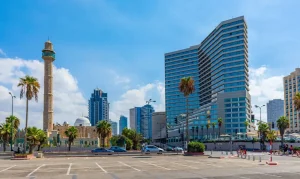Difficulties in moving to Israel
Repatriation is a complex and painstaking process. During the procedure, the repatriate must not only prove his Jewish roots, but also assure the consul of the seriousness of his intentions. One of the strong reasons for approval will be the desire to move to Israel.
But changing countries is not always a happy event. This is a considerable stress for the repatriate and his family because in addition to going through all the procedures for obtaining Israeli citizenship, you must not forget to find out the details about the country. Many repatriates return to their country of origin after a while, as they could not get used to the peculiarities of the Israeli state. We will tell you what repatriates face when moving to Israel for permanent residence, and it is up to you to decide whether it is worth choosing Jewish land as a permanent place of residence.
an Israeli citizenship specialist
Language
The first thing a repatriate hears in Israel is Hebrew, and from a “repatriate” a person turns into “Ole Hadash”. At first acquaintance, the language seems rough, incomprehensible, and strange. At least from his study of repatriates, the Arabic style of writing from right to left and, at first glance, the hieroglyphic style repels.
But in fact, everything is much simpler than it seems. Hebrew is a very logical language, where everything obeys certain rules. Those same “hieroglyphs” are actually letters of the alphabet, of which there are only 22, although five of them are used in two forms. Nonetheless, you will be told about all this in ulpans – special free educational institutions for repatriates.
Ulpan training
Studying in the ulpan will allow you to quickly learn the basics of Hebrew, understand interlocutors at the everyday level, write, read news and understand texts in basic documents. Hebrew is mandatory for those who want to independently obtain citizenship in Israel and immediately get a well-paid job, since knowledge of the language is one of the main requirements for employment. But you should not immediately refuse repatriation, because linguistics is difficult for you.
Work and employment
As stated above, language skills have a strong impact on the employment of a repatriate. True, there are certain procedures that allow you to confirm the qualifications obtained in the country of origin and work in your usual job both in person and remotely, if your profession allows it.
If you do not have a diploma of education, or you have not passed the nostrification, then the choice of vacancies for repatriates is limited: mainly work in shops, nursing homes and construction sites. But even here the state will come to the rescue – Israel has a high level of education and, if you wish, you can study at a university and get the desired profession with a diploma that is quoted all over the world.
Housing and real estate
Real estate prices around the world are constantly rising, every year complicating the lives of millions of citizens. Unfortunately, Israel is no exception. In 2021, the economic capital of Tel Aviv was ranked the most expensive city to live in worldwide, overtaking Paris and London. And of course, this status is justified – just look at the cost of housing both in the center and in the surrounding area.
But even here, not everything is as sad as it might seem. As in any other country, housing in large cities is available to those who have a good financial cushion. But Israel is not limited to Tel Aviv and Jerusalem. There are many other cities here, and even if they are a little smaller, housing here is many times more affordable. For example, many repatriates choose Rehovot, Netanya, Hadera, Bat Yam or Haifa for their permanent residence.
High standard of living but high cost of living
Israel is rightly famous for high salaries and high social guarantees. Furthermore, the transport, social and commercial infrastructures are well-developed and well-established. Medicine in Israel is one of the most advanced in the world, and the population is distinguished by excellent health.
At the same time, social security is at the proper level. The state takes good care of the elderly, children, women and the disabled. The country also has a high level of education and culture. In addition, there are a huge number of historical and religious monuments.
an Israeli citizenship specialist
But you have to pay for all the benefits of a developed country. At the first encounter of a repatriate with prices in Israel, many are in a slight culture shock, as the cost of utilities, food, and even tax rates when converting shekels into rubles are horrifying.
However, we often forget that the level of wages here is very different. And if now prices seem incredibly high to you, then just look at the statistics of average salaries in Israel: here you can live on the pay of a cashier in a supermarket, and not survive. Well, do not forget about the “absorption basket” in the first year after the move. And thanks to the warm climate and affordable quality medicine, many standard expenses are eliminated, such as the annual purchase of warm winter clothes.
Martial law
Few people have not heard of the Arab-Israeli conflict. It is he who is still the main drawback of the Promised Land. The country is almost constantly in a state of war. The world with the nearest countries is quite unstable and is constantly interrupted by military conflicts, although in 2021 the situation is becoming more and more calm—even a peace treaty was signed with the United Arab Emirates.
Israel is surrounded by countries, from the name of which even people inexperienced in politics have unpleasant feelings. We are talking about Iran, Syria, Lebanon, and the Gaza Strip. However, the Israeli armed forces have good combat capability, and the state takes care of civilians as much as possible. Furthermore, the United States provides constant financial and military support to the Jewish state, as its ally.
It is hard to believe, but almost all people in Israel are law-abiding, which indicates a highly developed civil society. However, for many repatriates with their special mentality, at first, it is hard to believe in this, but then they quickly get used to this state of affairs.
Transfer of personal belongings, furniture, and cars
Often, repatriates who plan closely to connect their lives with Israel and move here for permanent residence face difficulties in transporting personal belongings, furniture, and cars. Indeed, there are certain nuances with transportation.
But as in other cases, they are more associated with paperwork, queues, and communication difficulties. In this case, we recommend contacting specialists, since during the transfer you will have to fill out countless papers for each item being transported as carefully and clearly as possible.
Children of repatriates
Most of the repatriates who move to Israel for permanent residence go to the Promised Land with the whole family. And naturally, adults have concerns about the adaptation of children in a new country. We hasten to reassure you that one of the main values of the state and the citizens of Israel is the family and children, so you don’t have to worry about the issue of the child’s adaptation.
The main concern of repatriate parents will be the choice of an educational institution and the enrollment of a child in a kindergarten, school, or university. You don’t have to think about the language barrier, child bullying and acclimatization: children learn languages many times faster than adults, Israel is one of the most tolerant countries for immigrants, so it’s unlikely that they will offend your child simply because of their origin, and the climate can easily be changed to a more suitable one by choosing a city for permanent residence in the north or south of the country.
Climate
Israel is a warm and sunny country, the climate here is delightfully mild. For most people, it is a real paradise, because there are 330 sunny days a year. The only exceptions are lovers of frosty and snowy winters: for them, the subtropical climate will not be very comfortable.
Climatic conditions in the country are characterized by different zones. The most favorable places to live are areas with a humid Mediterranean climate. But in the Jewish state there are areas with both dry desert and highland climates. Thanks to this, repatriates always have a choice of residence, depending on their preferences and desires.
Features of the Jewish State
Israel is quite a religious country and this is reflected in many aspects of the lives of citizens. And if a person has a purely secular worldview, then it can be difficult for him to rebuild. In Israel, at the state level, they celebrate Shabbat – the seventh day of the creation of the world. Therefore, on Friday evening it will be difficult for a European person to find a place for cultural recreation and friendly gatherings, and on Saturday shopping trips are canceled—the lion’s share of shops are closed.
You will also have to get used to the new calendar, the schedule of weekends, public holidays: in Israel there are no New Year or May holidays familiar to us, but at the same time, the Israeli people celebrate their own religious holidays, for example, Shavuot, Sukkot, Rosh Hashanah and Pesach. It will not be difficult to get used to, but at first, the new way of life may be unaccustomed to the repatriate.
an Israeli citizenship specialist

